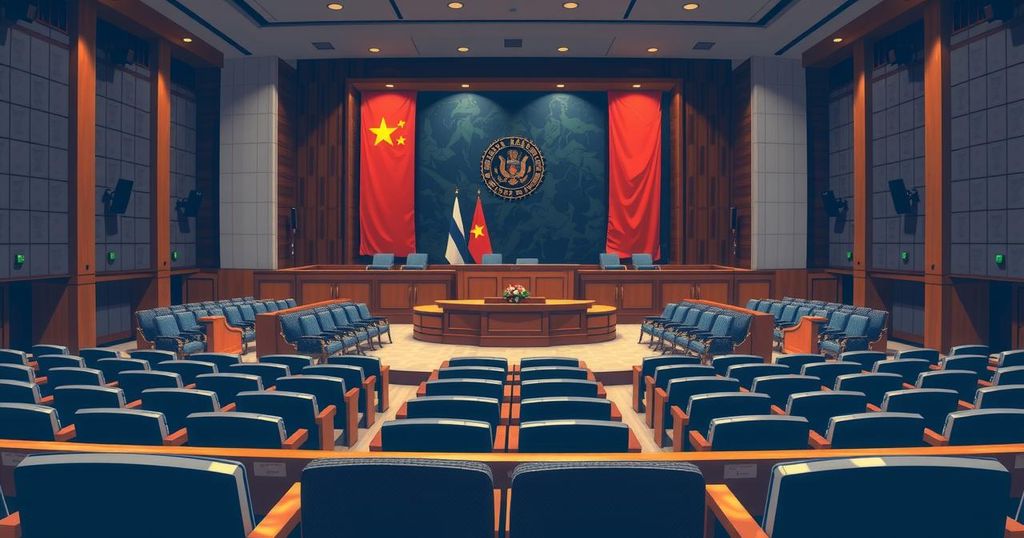Liberia’s House of Representatives Faces Leadership Crisis Amid Allegations

The House of Representatives in Liberia is embroiled in a leadership crisis, with Rep. Dixon Seboe accusing Deputy Speaker Thomas Fallah of attempting to unseat Speaker J. Fonati Koffa to exert control over House finances. Allegations of financial mismanagement and legislative maneuvers characterize the dispute, which remains unresolved and creates deep divisions among lawmakers. Fallah has yet to respond to these accusations, heightening tensions further.
CAPITOL HILL, Monrovia – The ongoing internal dispute within the House of Representatives in Liberia has intensified, featuring serious accusations from lawmakers against one another. The recent allegations from Rep. Dixon Seboe (District 16, Montserrado County) claim that Deputy Speaker Thomas Fallah has orchestrated efforts to destabilize Speaker J. Fonati Koffa’s leadership in order to gain control over House finances for personal gains.
During an appearance on OK FM’s Morning Rush show, Rep. Seboe alleged that Deputy Speaker Fallah has felt marginalized under Speaker Koffa’s leadership. He contended that Fallah’s aspiration for leadership drove him to spearhead efforts to unseat Koffa. “I think fundamentally, it is about who divides the cake. There are people in this country who feel they own the Legislature” – Seboe stated.
Seboe expressed his belief that Fallah’s domination of the House, after nearly two decades in office, has led him to view the current situation unfavorably as it limits his influence in committee chairmanships. He emphasized that “He thought he should have been Speaker. Now that he isn’t, it means he cannot decide who chairs which committee.”
Deputy Speaker Fallah’s influence is notable in the House’s current leadership crisis. Allegations persist that his detachment from Speaker Koffa has emboldened the Majority Bloc, which many legislators characterize as participating in a “legislative mutiny.” Fallah has been instrumental in restructuring committee assignments, notably removing Rep. Seboe from the powerful Ways, Means, and Finance Committee.
During these tumultuous sessions, the Majority Bloc chose Rep. Richard Koon as their new Speaker, prompting Speaker Koffa and his allies to challenge these actions legally, leading to a Supreme Court ruling deeming the maneuvers illegitimate. The court asserted that any actions conducted outside the constitutional framework were ultra vires.
Moreover, Rep. Seboe accused Fallah of historical financial mismanagement, noting their conflict began when Fallah purportedly advised him to mislead colleagues regarding a special disbursement. “This is the cause of the fight at the Capitol Building—people want to steal and eat people’s money,” Seboe asserted.
This is not the first instance of purported misconduct involving Fallah. Past allegations from Speaker Koffa indicated that some lawmakers operated as a “cartel,” manipulating the national budget for financial enrichment. Koffa alleged, “The reason behind their attempts to remove me is my persistent refusal to allow lawmakers to steal from the government’s coffers.”
The leadership crisis remains unresolved, with divisions entrenched among lawmakers. Seboe indicated ongoing tension, claiming both blocs are acting outside the law, stating, “It is pathetic that for six months, we have been unable to resolve this situation on Capitol Hill.” He revealed that a boycott from the Rule of Law Caucus occurred due to the Majority Bloc’s perceived illegitimacy.
As of yet, Deputy Speaker Fallah has not responded to these provocative allegations. The escalating tensions suggest that any forthcoming response may further exacerbate the existing feud among legislators, leaving the power struggle at the Capitol unresolved.
The leadership crisis in Liberia’s House of Representatives reflects deep-seated divisions among lawmakers, primarily characterized by accusations of ambition and financial misconduct. Rep. Dixon Seboe’s accusations against Deputy Speaker Fallah highlight concerns regarding the manipulation of legislative roles and budgetary decisions. This conflict reveals broader implications for governance and accountability within the House, emphasizing the need for adherence to legal frameworks to ensure orderly conduct and resolution of disputes. Ultimately, the situation remains precarious as factions remain steadfast in their stances without any sign of reconciliation.
Original Source: frontpageafricaonline.com







